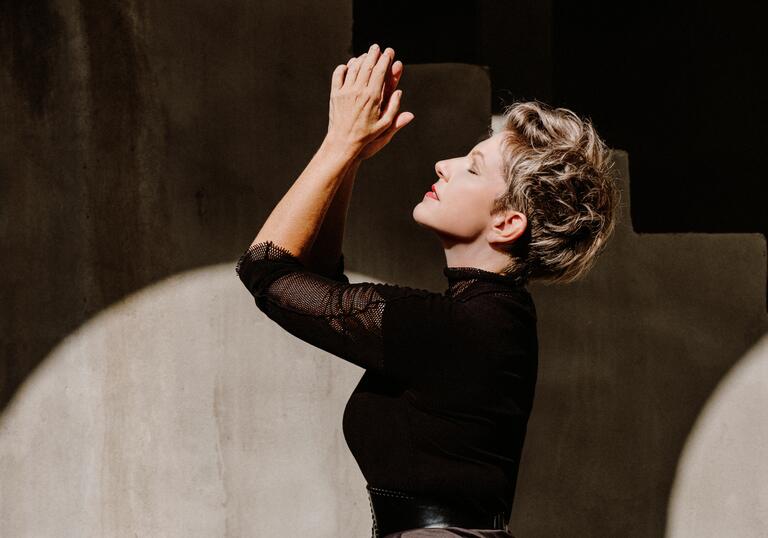
Programme and performers
Giacomo Carissimi Jephte
Henry Purcell Dido and Aeneas
Il Pomo d’Oro
Maxim Emelyanychev harpsichord and conductor
Andrew Staples Jephte and Aeneas
Carlotta Colombo Figlia and Second Woman
Joyce DiDonato Dido
Fatma Said Belinda
Beth Taylor Sorceress
Hugh Cutting Spirit
Massimo Altieri Sailor
Alena Dantcheva First Enchantress
Anna Piroli Second Enchantress
Il Pomo d’Oro Choir
Singers from Il Pomo d’Oro Choir Jephte small roles
Libretti
1. Narrator
Cum vocasset in proelium filios
Israel rex filiorum Ammon
et verbis Jephte acquiescere noluisset,
factus est super Jephte Spiritus Domini
et progressus ad filios Ammon
votum vovit Domini dicens:
2. Jephte
Si tradiderit Dominus filios Ammon
in manus meas, quicumque primus
de domo mea occurrerit mihi,
offeram illum Domino in holocaustum.
3. Narrator
Transivit ergo Jephte ad filios Ammon,
ut in spiritu forti et virtute Domini
pugnaret contra eos.
4.
Et clangebant tubae et personabant tympana
et proelium commissum est adversus Ammon.
5. Narrator
Fugite, cedite, impii, perite gentes,
occumbite in gladio. Dominus exercituum
in proelium surrexit et pugnat contra vos.
6. Narrator
Fugite, cedite, impii, corruite,
et in furore gladii dissipamini.
7. Narrator
Et percussit Jephte viginti civitates Ammon
plaga magna nimis.
8. Narrator
Et ululantes filii Ammon, facti sunt
coram filiis Israel humiliati.
9. Narrator
Cum autem victor Jephte in domum suam
reverteretur, occurrens ei unigenita filia sua
cum tympanis et choris praecinebat:
10. Daughter
Incipite in tympanis, et psallite in cymbalis.
Hymnum cantemus Domino, et modulemur canticum.
Laudemus regem coelitum,
laudemus belli principem,
qui filiorum Israel victorem ducem reddidit.
11.
Hymnum cantemus Domino, et modulemur canticum,
qui dedit nobis gloriam et Israel victoriam.
12. Daughter
Cantate mecum Domino, cantate omnes populi,
laudate belli principem,
qui dedit nobis gloriam et Israel victoriam.
13.
Cantemus omnes Domino,
laudemus belli principem,
qui dedit nobis gloriam et Israel victoriam.
14. Narrator
Cum vidisset Jephte, qui votum Domino voverat,
filiam suam venientem in occursum, in dolore
et lachrimis scidit vestimenta sua et ait:
15. Jephte and Daughter
Heu mihi! Filia mea,
heu decepisti me, filia unigenita,
et tu pariter,
heu filia mea, decepta es.
Cur ergo te pater, decipi,
et cur ergo ego
filia tua unigenita decepta sum?
Aperui os meum ad Dominum
ut quicumque primus de domo mea
occurrerit mihi, offeram illum Domino
in holocaustum. Heu mihi!
Filia mea, heu decepisti me,
filia unigenita, et tu pariter,
heu filia mea, decepta es.
Pater mi, si vovisti votum Domino,
reversus victor ab hostibus,
ecce ego filia tua unigenita,
offer me in holocaustum victoriae tuae,
hoc solum pater mi praesta
filiae tuae unigenitae antequam moriar.
Quid poterit animam tuam, quid poterit te,
moritura filia, consolari?
Dimitte me, ut duobus mensibus
circumeam montes, et cum
sodalibus meis plangam virginitatem meam.
Vade, filia mia unigenita,
et plange virginitatem tuam.
Abiit ergo in montes filia Jephte,
et plorabat cum sodalibus virginitatem suam, dicens:
Plorate colles, dolete montes,
et in afflictione cordis mei ululate!
Ululate!
Ecce moriar virgo et non potero
morte mea meis filiis consolari,
ingemiscite silvae, fontes et flumina,
in interitu virginis lachrimate!
Lachrimate!
Heu me dolentem in laetitia populi,
in victoria Israel et gloria.
Patris mei, ego, sine filiis virgo,
ego filia unigenita moriar et non vivam.
Exhorrescite rupes,
obstupescite colles, valles
et cavernae
in sonitu horribili resonate!
Resonate!
Plorate filii Israel,
plorate virginitatem meam,
et Jephte filiam unigenitam
in carmine doloris lamentamini.
Plorate filii Israel,
plorate omnes virgines,
et filiam Jephte unigenitam
in carmine doloris lamentamini.
From the Old Testament Book of Judges
1. Narrator
When the King of the children of Ammon
declared war on the children of Israel
refusing to concede to Jephthah’s message
the spirit of the Lord came upon Jephthah
And he advanced towards the Ammonites
solemnly vowing to the Lord, saying:
2. Jephte
Lord, if you deliver the Ammonites
into my hands, whoever should first
run from my house to meet me, I shall offer up
to the Lord as a burnt sacrifice.
3. Narrator
So Jephthah crossed to the Ammonites,
strong in spirit by the power of the Lord,
to fight against them.
4.
Trumpets blared and drums thundered,
and battle was waged against Ammon
5. Narrator
Flee, surrender, evildoers, perish, fall under
the sword. The Lord has roused an army into
battle and fights against you.
6. Narrator
Flee, surrender, evildoers, fall, and be
scattered under the fury of the sword.
7. Narrator
And Jephthah struck twenty cities of Ammon
with an almighty blow.
8. Narrator
And wailing, the children of Ammon
were humbled before the children of Israel.
9. Narrator
But when Jephthah returned
victorious to his home, his only daughter ran
to him with timbrel and song, and said:
10. Daughter
Strike up the drums, dance to the cymbals
Virgins, let us sing a hymn and make a song.
Let us praise the King of heaven,
let us praise the prince of war,
The leader who brought victory to the children of Israel
11.
Let us sing a hymn to the Lord, and make a song
to him who gave glory to us and victory to Israel
12. Daughter
All the people, sing to the Lord with me
Praise the prince of war
who gave glory to us and victory to Israel.
13.
Let us all sing to the Lord,
let us praise the prince of war
who gave glory to us and victory to Israel.
14. Narrator
When Jephthah who pledged a vow
to the Lord, saw his daughter run to meet him,
in grief and tears he tore his clothes and said:
15. Jephte and Daughter
Alas for me, my daughter,
you have undone me, my only daughter,
and you equally, alas,
my daughter, you are undone.
Why, father, have I undone you?
And why am I,
your only daughter, undone?
With my own mouth I said to the Lord
that the first person to meet me from my house
I would offer to the Lord
as a burnt sacrifice. Alas for me!
My daughter, you have undone me,
my only daughter, and you equally, alas,
my daughter, you are undone.
Father, if you pledged a vow to the Lord
when you returned victorious from the enemy,
see, I, your only daughter,
offer myself as a sacrifice to your victory,
This one thing, father,
grant your only daughter before I die.
My daughter, about to die,
what can comfort your soul?
Send me away that I may
roam the mountains for two months
And that I may weep over my virginity with my friends.
Go, my daughter, my only daughter,
And weep over your virginity.
So Jephthah’s daughter set off for the mountains
and with her friends she wept over her virginity, saying:
Weep, hills, grieve, mountains,
And at my heart’s torment, wail!
Wail!
See, I shall now die a virgin and I shall not be able to find
consolation in my children at my death,
cry with anguish, forests, springs and rivers,
weep over the death of a virgin!
Weep!
Alas, I grieve while a people rejoices
in Israel’s victory and my father’s glory.
I, a childless virgin, an only daughter,
shall die, and not live.
Tremble, rocks,
be stunned, hills,
valleys and caves,
with a dreadful noise, resound!
Resound!
Weep, children of Israel,
weep over my virginity,
and lament for Jephthah’s only daughter
in a song of sorrow.
Weep, children of Israel,
all weep over a virgin,
and Jephthah’s only daughter
Lament in a song of sorrow.
Translation © Kenneth Chalmers
Artist biographies
The ensemble Il Pomo d’Oro was founded in 2012. It is characterised by an authentic, dynamic interpretation of operas and instrumental works from the Baroque and Classical periods. Its musicians are all specialists in historical performance practice. The ensemble has been led by the conductors Riccardo Minasi, Stefano Montanari, George Petrou, Enrico Onofri and Francesco Corti; Maxim Emelyanychev became its Chief Conductor in 2016 and Francesco Corti its Principal Guest Conductor in 2019.
It regularly appears at prestigious concert halls and festivals all over Europe. After the worldwide success of the programme In War & Peace with Joyce DiDonato, Il Pomo d’Oro presented My Favourite Things and is now on tour worldwide with EDEN, its latest album with the American mezzo-soprano.
Its award-winning discography ranges from operas by Handel, Alessandro Scarlatti, Stradella and Vinci to vocal recitals and instrumental albums. In 2022 it began recording a cycle of Mozart symphonies and selected solo concertos with Maxim Emelyanychev.
Il Pomo d’Oro is official ambassador of El Sistema Greece, a humanitarian project to provide free musical education to children in Greek refugee camps. It gives charity concerts and offers workshops and music lessons according to the El Sistema method on a frequent regular basis in various refugee camps in Greece.
The name of the ensemble Il Pomo d’Oro refers to Antonio Cesti’s opera from the year 1666. Composed for the wedding celebrations of Emperor Leopold I and Margarita Teresa of Spain, Il Pomo d’Oro was probably one of the largest, most expensive and most spectacular opera productions in the still-young history of the genre.
Beth Taylor is one of today’s most exciting young mezzo-sopranos.
Recent highlights include her role debut as Arsace (Rossini’s Semiramide) for Deutsche Oper Berlin; debuts at the Zurich Opera House as Giuliano Gordio (Cavalli’s Eliogabalo), Berlioz Festival as Ursule (Béatrice et Bénédict), Lausanne’s Théâtre de Beaulieu in Mozart’s Requiem and at the Gulbenkian in Lisbon in Beethoven’s Missa solemnis. She has also sung Anna (Les Troyens) with the Orchestre Révolutionnaire et Romantique at La Côte- Saint-André, the Palace of Versailles, Berlin Philharmonie, BBC Proms and the Salzburg Festival; Mozart’s Requiem with Raphaël Pichon in Paris, Barcelona, Valencia, Versailles, Bordeaux and Dortmund, Berlioz’s Roméo et Juliette at the Gulbenkian Lisbon with John Nelson and Mendelssohn’s Elijah in Lyon.
Over the past few years, she has made a number of important appearances at prestigious venues, notably her acclaimed debut at the 2022 Glyndebourne Festival as Bradamante (Alcina), Erda (Das Rheingold), First Norn (Götterdämmerung) and Schwertleite (Die Walküre) in the Deutsche Oper Berlin’s new Stefan Herheim Ring cycle under Sir Donald Runnicles. She also sang her first Falliero (Rossini’s Bianca e Falliero) in a new production at Oper Frankfurt.
Beth Taylor is a graduate of the Royal Conservatoire of Scotland and the Open University. She currently works with Jennifer Larmore and Iain Paton. She is the winner of the 2018 Gianni Bergamo Classical Music Award and was awarded Third Prize at the 2019 Wigmore Hall Competition.

Our Patrons and supporters
Find out about our Patrons, who help us keep our programme accessible to everyone and allow us to continue investing in the artists and communities we work with.
Love the arts? Become a Patron to engage more closely with our programme.

Who we are
Meet our management team, our Board and the Trustees of our charitable arm, Barbican Centre Trust.
